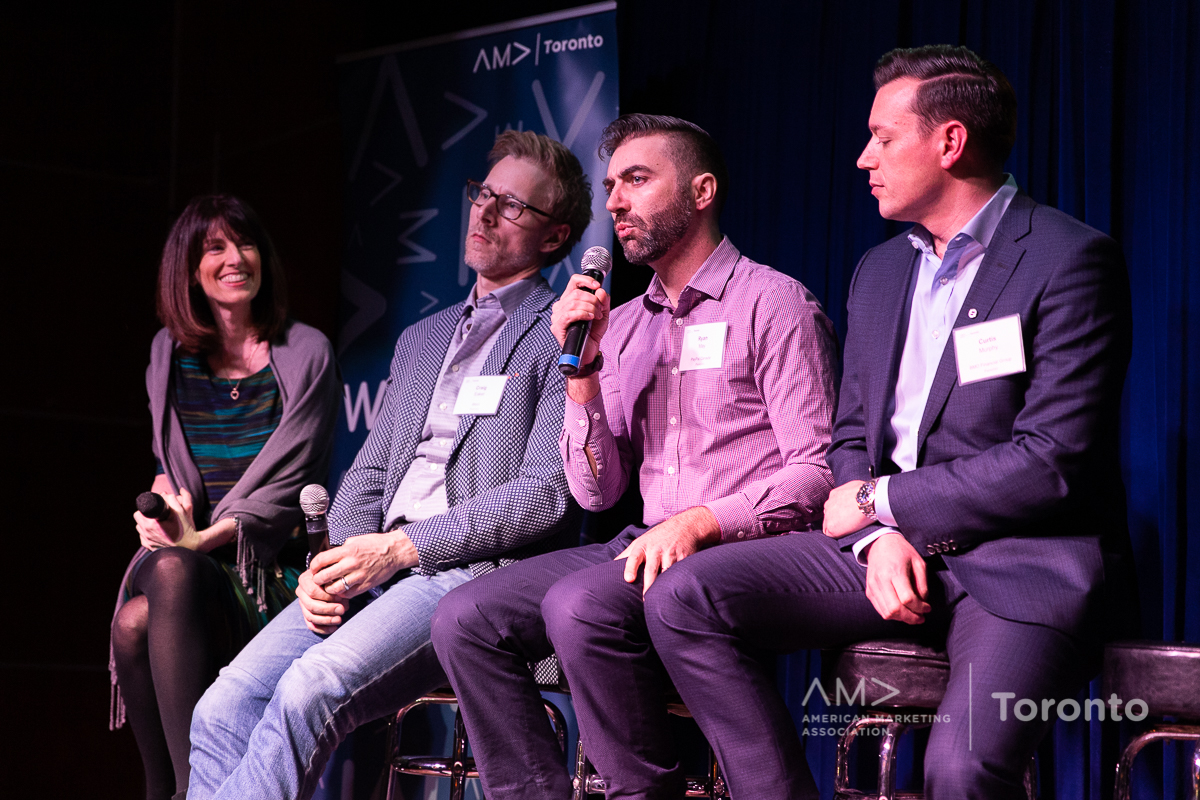By Zeel Gandhi | Manager – Public Relations, AMA Toronto
The marketing industry faces unprecedented opportunities and challenges in the age of AI. With the rise of digital platforms and advanced technologies, marketers have transformed how they connect with their audiences and optimize campaigns. However, this new era also brings concerns about data privacy, ethical practices, and the need for adaptability.
At the 13th annual CMO Breakfast Panel, ‘The CMOs vs the Robots,’ we invited five industry experts to discuss the ever-evolving marketing landscape, with a focus on AI and digital transformation.
- Erinn Piller, Head of Business Marketing, TikTok
- Jason Boyer, Partner & CMO, Deloitte LLP
- Justine Melman, Chief Customer Officer, AIR MILES Reward Program
- Rachel G. Olive, Vice President, Sony Pictures Entertainment
- Caspian Yu, Managing Director, Canadian Credit Cards & Payments Marketing, BMO
These marketers were excited to share their insights and experience with the audience, helping them gain new perspectives on topics that matter. The biannual CMO Survey was used as a springboard for the discussion. The survey, issued by Duke University’s Fuqua School of Business in partnership with the American Marketing Association (AMA) and Deloitte, aims to predict future markets, track marketing excellence, and improve the value of marketing in organizations and society.
Here are the top five insights our panelists shared during their conversation.
Here are the top five insights our panelists shared during their conversation.
1. Marketers must embrace Artificial Intelligence (AI) to improve efficiency and productivity.
AI's rise is transforming how we work, and its impact is already being felt. By automating mundane tasks, AI technology can enhance efficiency and productivity, freeing up time for more important tasks. Additionally, AI's ability to analyze data and provide insights enables quicker and better decision-making, surpassing what humans could achieve alone.
"I think that depending upon where or how mature your business is, it's either going to be transformative by revolutionizing marketing strategies, or it's going to augment the existing operations to enhance efficiency and productivity," Rachel G. Olive said while highlighting the impact of AI on business.
Marketers today face both exciting opportunities and challenges as they leverage AI technology. The journey may be challenging, especially the legal implications and privacy aspects, but by embracing change and adapting to the new marketing realities, marketers can unlock the full potential of AI and create meaningful connections with their audiences.
2. Now is the time for brands to reach out to potential customers and capitalize on opportunities created by competitors pulling back their marketing budgets.
The CMO Survey found that over 40 per cent of marketers were less optimistic this year and that more than half of them reported inflationary pressures are causing a decrease in spending.
Erinn Piller, however, was quick to point out that with the right approach, businesses can seize the opportunity to create successful campaigns and maximize their ROI. “Now is the time to lean in and take advantage of the white space created by competitors pulling back their budgets. It's an opportune time for brands to capitalize and even consider product launches," she added.
TikTok, in particular, has followed this strategy and has now proven to be a preferred platform for SMEs and entrepreneurs looking for community-driven engagement and significant growth potential. The platform's range of advertising options, “combining information with entertainment,” allows SMEs to reach a wider audience at a fraction of the cost of traditional marketing methods, helping them get the most bang for their buck.
3. Marketers must be prepared to adapt and embrace the changes brought about by the digital revolution to stay competitive in today’s market.
Technology advancements have created opportunities for businesses to reach their target audiences more effectively and efficiently. With this in mind, marketers must adapt and embrace the changes brought about by the digital revolution to stay competitive in today’s market. In fact, as per the most recent CMO Survey, digital dominates the marketing landscape, with 53.8 per cent of all marketing spending being concentrated in this realm.
“CMOs need to stay ahead of the curve by embracing emerging technologies and understanding consumer behaviour in the digital realm," said Jason Boyer. "A digital transformation is no longer an option; it's a necessity.”
With the increased digital adaptability, the marketing landscape is not immune to the effects of digital fatigue. "We are definitely seeing digital fatigue is still very much a thing," observes Jason. Marketers across various sectors are facing the challenge of engaging with audiences who are overwhelmed by the sheer volume of digital content. As a result, organizations are prioritizing investments in analytics and relationship intelligence systems along with a shift towards more personalized, one-on-one relationship-focused programming, which is essential to combat digital fatigue and foster meaningful connections with customers.
4. Opportunities for Brand BuildingMarketers must navigate the demands for short-term performance while building toward sustainable long-term success.
Marketers are facing the challenge of demonstrating short-term measurable results and maintaining trust from financial stakeholders while also planning for long-term brand goals. As per the CMO Survey, companies are spending 59.9 per cent on short-term performance – versus 40.1 per cent on long-term branding, while the ideal scenario would be 50% each.
Caspian Yu highlighted the importance of leveraging diagnostic tools and analytics to connect the dots between short-term investments with long-term outcomes. "Marketers need to continue to engage on this journey because they're going to be demanded to hold up to the short-term performance to justify the investment but also be able to justify that build towards the long term.”
Marketers need to demonstrate the efficiency gained through demand generation investments, which in turn enhances the performance of demand capture activities.
“Understand what your audience is looking for, how they're engaging with your platforms, and how that intersects with your business strategy. Strive to foster a culture of innovation, and test and learn will help your brand grow in the long run,” he added.
5. Bringing on Individuals with diverse skill sets and experiences will allow businesses for more creative problem-solving approaches.
The CMO Survey results showed 20.1 per cent respondents ranking talent as a top category that they're focused on to achieve growth and to be successful as an organization. But having a team with different backgrounds and experiences will help businesses stay ahead of their competitors and will also allow them to access new markets and create an inclusive culture where everyone feels valued and respected.
Echoing this sentiment, Justin Melman said, “I think a lot of companies are trying to fit the perfectly shaped peg into the perfectly shaped hole, and there's a lot of value in bringing on people with diverse skill sets to be able to take whatever that role might be and expand it into areas that you hadn't previously imagined.”
Along with having a diverse team, it is also important for marketers to collaborate and build strong relationships with the various internal partners, including analytics, finance, and customer research, to ensure that they are creating strategies based on data-driven insights and have the financial resources to implement them.
"Our relationship with our partners is critical. They support us as we build out business cases for either new product development or if we're looking at changes within our marketing or product strategy," she affirmed.
Summary
In today's marketing landscape, marketers have many opportunities and challenges. With digital transformation and AI technology playing a significant role, sustainable success requires capitalizing on market opportunities, embracing digital innovation, balancing short-term and long-term investments, fostering diverse talents, and harnessing the potential of AI. Even though the journey can be challenging, marketers who adapt to these new marketing realities can unlock AI's full potential and create meaningful connections with their audiences.

Zeel Gandhi
Manager – Public Relations, AMA Toronto
Zeel Gandhi is a seasoned brand communications and public relations professional currently working as a Communications Specialist at Definity Financial while actively contributing as a public relations manager at AMA Toronto.



